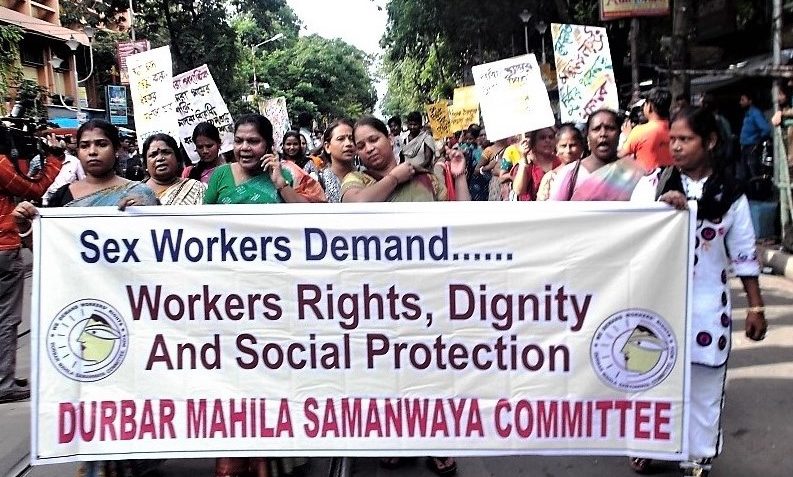5 lessons from the Durbar Sex Worker Collective
 © Durbar Mahila Samanwaya Committee
© Durbar Mahila Samanwaya Committee
Sex workers in Sonagachi, India’s biggest red-light district, have a compelling approach to staying healthy and financially empowered despite the barriers that stand in their way. Find out how.
- Bank accounts change lives. In 1995, 12 sex workers started a multi-purpose cooperative bank. Today, the sex-worker led bank has 30,000 members and an annual turnover of $5 million. It offers high interest savings options and low interest loans, allowing sex workers to fund their children’s education, take care of their health and buy homes, all sustained through additional social enterprise income generation, which includes condom and sanitary pad sales in the red-light district. Only sex workers are eligible for an account.
- Listen to the kids. What happens when children take control of their rights? ‘We are the foot soldiers’ is an organisation of 1,500 daughters and sons of sex workers who came together when they realised that they would not be free to live dignified lives until their mothers’ work was recognised as a legitimate profession, with labour rights. These young people are working on the frontline of human rights advocacy, fighting stigma and discrimination through arts and dance and enhancing opportunities for children of sex workers through education, vocational training and sports. Their ultimate aim is to achieve full labour rights for their mothers, and they are currently hoping to raise funds for a crèche and a retirement home in the red-light district.
- Tackling sex trafficking needs a united front. Soon after founding the sex worker collective, Durbar activists were concerned with the problem of underage girls trafficked into the red-light district against their will. In response to this, they formed self-regulatory boards, each comprising of sex workers, survivors of sex trafficking, local councillors, doctors and lawyers, and any other community leader or influencer who is willing to participate. They undertake counselling and age determination through official documents (when available) and wrist bone scans. If a woman or girl is underage or if she has entered the brothel out of coercion or deception, the board sends them back home or to a place of their choosing. Additional support through vocational training, job placements and referrals to services are also provided on a case-by-case basis. Between 2014 and 2017, 150 women and girls were identified as being trafficked and removed from the brothels and offered continued support. In recognition of the effectiveness of this strategy, the Indian Supreme Court has recommended that self-regulatory boards be replicated to address sex trafficking in all major cities in the country.
- Dreaming is healthy! Durbar sex workers pioneered a set of ‘Dream Building’ sessions to empower sex workers, provide a renewed sense that they are as entitled as others in mainstream society to have hopes and aspirations, and find ways to work towards these aspirations. In partnership with Glasgow University, they tested the effectiveness of Dream Building through a large randomised control trial and findings indicate that the approach reduces the shame associated with sex work, while improving self-worth, increasing savings and health-seeking behaviours. What is particularly interesting is that the dream building sessions do not touch on the topic of health, indicating that self-worth and aspirations improve health-seeking behaviours.
- Follow the three Rs. Durbar started as an HIV prevention programme focusing on sexual and reproductive health services provided by fellow sex workers, awareness raising and condom distribution. However, the peer health workers soon highlighted that these efforts were futile without addressing other issues confronting sex workers daily: police raids, extortion by local goons and stigma in healthcare settings. They started going beyond their duties as health educators, and worked to rally and unite sex workers in the local area. Since then they operate on three interconnected principles, known as 3R: Respect and dignity to sex work and towards sex workers; Reliance on the knowledge and wisdom of the community of sex workers; and Recognition of sex work as an occupation and protect their occupational and human rights.
The visit was funded by knowledge exchange grants from Glasgow University and Frontline AIDS, and included sex workers from Malawi and Vietnam and Frontline AIDS partners from Pakachere and SCDI working with sex worker communities. Get more information about the Durbar Sex Worker Collective.
Tags
GenderIndiaSex workSexual and reproductive health and rights (SRHR)


